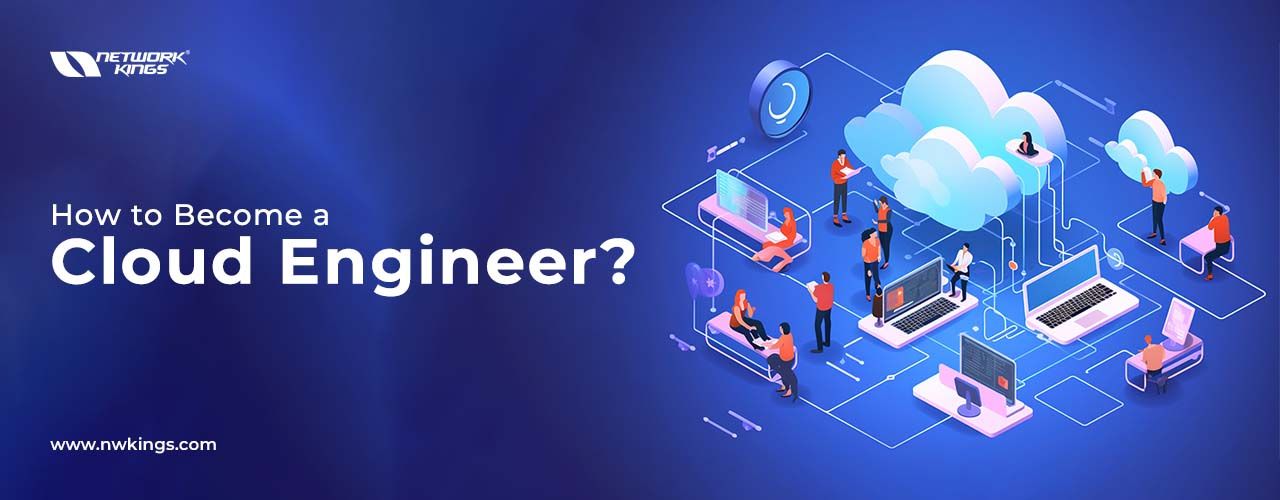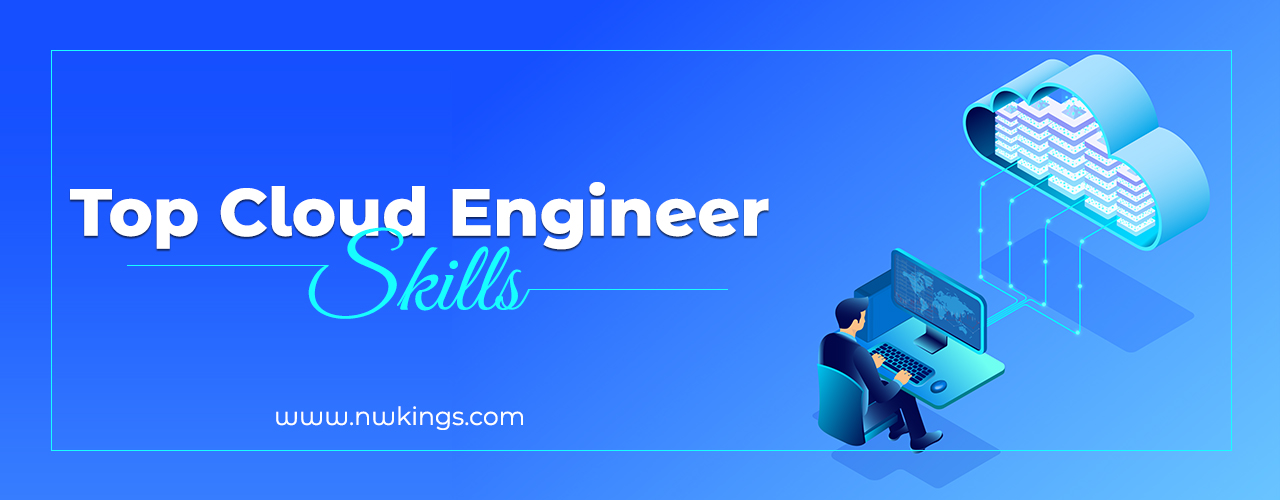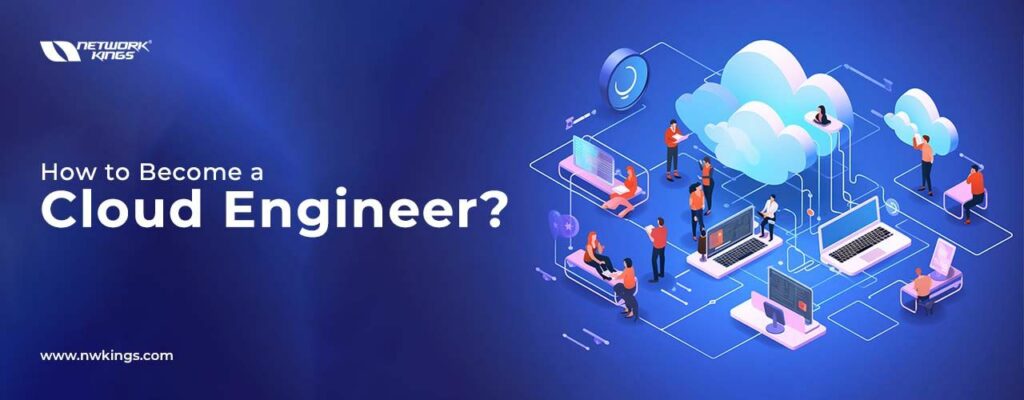
Cloud engineering has gained a great deal of traction recently as it presents itself to be the perfect career option for those wanting to get amongst groundbreaking developments in tech. So if you are looking at taking up this path then here are some tips on how to become a cloud engineer in IT.
Aspiring cloud engineers need to have a basic understanding of the fundamentals of cloud computing, including its architecture, components and different kinds of services offered by suppliers. They should also possess robust technical knowledge in software development, network setup and security protocols.
After you have gained these skills through formal training or self-study courses, you can go after professional qualifications from esteemed organisations such as Amazon Web Services (AWS), Microsoft Azure or Google Cloud Platform (GCP). This will give you an advantage when applying for jobs or pursuing additional learning programmes to update your expertise on new technologies.
The brilliant thing about becoming a cloud engineer is that there are loads of job opportunities accessible across various industries due to its increasing popularity and scalability. For experienced professionals wanting to stay up-to-date with their skill set, continuing education plans may likewise help them progress further in their career path. No matter your experience level or background – taking advantage of the correct cloud engineering capabilities can open plenty of chances within this booming sector.
Unravelling the Concept of Cloud Engineering
Figuring out the idea of cloud engineering can be a baffling thing for those new to this particular field. Before deciding to become a cloud engineer, one must comprehend precisely what cloud engineering entails and how it varies from other related disciplines. Put simply, being a Cloud Engineer involves creating end-to-end solutions by planning and constructing applications and infrastructures on an existing cloud platform.
If you want to be a successful cloud engineer, then you need to have a strong understanding of networking basics like LANs, WANs and VLANs. Plus, proficiency in popular virtualization technologies such as VMware vSphere or Microsoft Hyper-V is also required. On top of that, if you are looking at investing in public clouds like Amazon Web Services (AWS), Google Cloud Platform (GCP) or Microsoft Azure – your knowledge of system architecture will come into play too.
Having knowledge and experience of all these components will give an aspiring cloud engineer the capacity to plan efficient answers for complex IT problems, bearing in mind cost factors as well as scalability and performance objectives set by their customer/stakeholder. It’s also essential that any cloud engineer has a comprehensive comprehension of security concerns related to public clouds – such as providing safe system access points via identity management services or creating secure data storage systems with backup mechanisms. Doing this can be daunting but having insight into how it works before actually attempting makes things simpler.
Putting it all together, becoming an expert cloud engineer is no walk in the park. It requires a great deal of knowledge and practical experience across multiple domains as well as extensive technical skills that span from software development to intricate networking architectures. To obtain such a skill set, one can go through courses online or more comprehensive study programs at educational institutions – both are excellent routes for learning!
But having proficiency with scripting languages like Python or NodeJS will give you an edge: these scripts help automate certain tasks associated with this role; think automating deployment apps management server farms via advanced containerization frameworks, e.g., Docker…all integral parts to be successful in this field. So if you’re serious about wanting to make headway here then best start honing those scripting and automation abilities now!
Cloud Certification: An important cornerstone on How to Become a Cloud Engineer

Cloud Certification is a fundamental element to becoming a Cloud Engineer. If you are aiming for success in the field, then getting certified is an absolute necessity. This certification gives solid information about all components and services that form the cloud environment along with different ways it can be used; plus qualified engineers will have no trouble managing and keeping up their clouds’ ecology, ensuring its appropriate utilization while still economising resources. Recognition of such type also provides employers assurance when appointing cloud engineers since they now know what quality they would get if hiring someone who has been through this process Post-certification.
Gaining a certification is one way for engineers to demonstrate their ability and expertise in the field. This can enable employers to make an informed decision when selecting personnel, as it not only shows that they have an understanding of the technology but also highlights their proficiency in dealing with any demanding tasks or situations. Moreover, having this qualification could open up more job prospects since many organisations are inclined towards hiring certified professionals due to greater assurance of competency levels. To obtain such validation, aspirants can choose between taking online courses or getting hands-on training from experienced experts within the industry.
Doing cloud engineering certifications can be a great way to gain recognised qualifications and show potential employers you are knowledgeable in the field. Courses will educate students on every part of handling and maintaining clouds, from putting together servers/databases to checking performance results as well as automating installations. After completing either relevant coursework or tests for qualification individuals usually get certificates from respected organisations that illustrate their abilities in these areas too.
All in all, having certified engineers within your team provides both workers and companies with further assurance; it helps businesses make sure they’re recruiting reliable experts who have expertise in managing cloud settings correctly.
Mapping the Journey from a beginner to a Certified Cloud Engineer

Gaining a career in the cloud engineering field can be both stimulating and gratifying. Yet, for successful outcomes, you have to plan meticulously. If you lack an organised lifestyle from novice to experienced cloud engineer, it is easy to become confused by the huge amount of knowledge demanded. Various roadmaps are available which tell what competencies should be learned and which certificates need to be acquired as part of becoming a proficient cloud specialist.
Beginning your voyage towards being certified requires recognising the basics regarding clouds. What do they mean? How does one apply them practically? All these queries must first answered before advancing any further into this role.
Getting to grips with the fundamentals of how cloud services provide storage, networking, computing and management is essential. After mastering these concepts you can start getting involved in building infrastructure on public clouds or private ones based at your premises. It’s vital to get some hands-on experience working with major public cloud providers such as AWS, Azure and Google Cloud Platform during this phase – that way you’ll be familiarised with the architecture before taking any certification exams. Plus it also gives a nice insight into what using these solutions looks like in real life!
The following step involves getting precise knowledge related to a particular provider’s tech stack and its capacities for development, deployment, monitoring and management procedures and security conformity. Depending on the type of workloads supported by an individual’s organisation or desired career pathway, it might be essential to become certified in more than one public cloud platform or specialise in certain areas such as NoSQL databases or DevOps finest practices.
So then once all other steps have been done individuals should start preparing for their pertinent certification tests and hands-on test simulations for practice evaluation purposes. It is also vital to keep up with new tech advancements and trends so that you remain competitive within this ever-shifting sector thus keeping certifications from becoming dated too rapidly after they are acquired. With proper preparation.
Training Courses that facilitate the transition into Cloud Engineering
Making the move to cloud engineering can be hugely intimidating, but thankfully there are plenty of training courses available that you could make use of. If you’re serious about getting into this field then a certification authorised by one of the major platforms is essential to demonstrate your competency and knowledge as a cloud engineer. Acquiring these certifications will provide an arsenal full of tools and experience ready for success when working as a cloud engineer!
If starting from scratch then vendor-neutral options such as CPC (Cloud Professional Certification) or CCE (Certified Cloud Engineer) would probably best suit beginners; they cover everything from fundamental basics right through to virtualisation which will push any newbie understanding further.
For those in search of a more personalised experience that is geared towards their particular level of expertise or industry needs, vendor-specific certifications are available such as Microsoft Azure and Amazon Web Services (AWS). The CCE certification goes further to give engineers the skills and knowledge they need to design, construct, operate and optimise cloud applications and services.
It looks into topics like scalability strategies, and hybrid/multi-cloud architectures whilst exploring security measures, automation capabilities and DevOps on cloud infrastructure too. This provides better insight into storage technologies management alongside cost-cutting for your business – giving you an overall competitive edge!
AWS offers a range of certifications focused on different levels of expertise concerning their own platform’s offerings, which can help you in specific job roles such as solutions architecture design and deployment or operations support. Similarly, Microsoft has its comprehensive suite of certificates to assist newcomers in getting up to speed quickly, along with providing advanced-level accreditation created for experienced IT professionals who wish to specialise in Azure products like the Azure Security Engineer Associate or the Azure Solutions Architect Expert certification.
These sessions will give you everything you need to become an accomplished cloud engineer – from fundamental information regarding basic concepts to more complex topics related to particular vendors. Whether it’s your first experience with cloud engineering or if are trying to further enhance your career these qualifications will provide enough groundwork for achieving success within this thrilling field!
Job Opportunities in the realm of Cloud Engineering
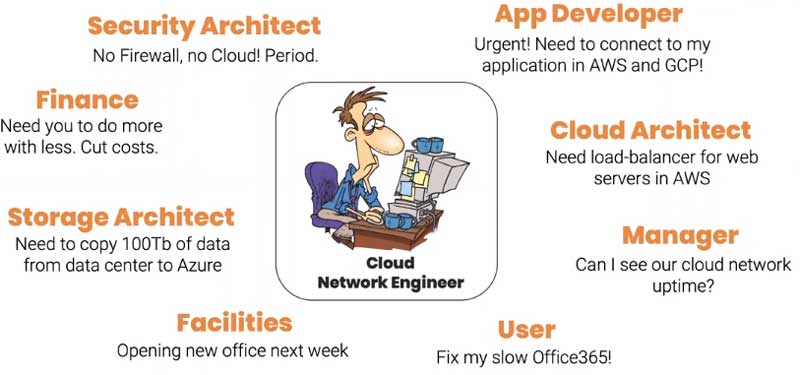
Cloud Engineering is quickly becoming one of the most sought-after roles around in today’s IT industry. This expanding field has provided lots of new job opportunities and various routes to success for people looking to get involved with cloud computing. So what is Cloud Engineering? In a nutshell, it involves designing, constructing and managing systems and applications based on clouds.
The horizon is the limit with regards to all that you can do with this type of engineering – from formulating complex calculations utilizing bleeding edge devices to fabricating custom stockpiling designs for mission-critical applications. The scope of employment roles identified with cloud engineering is immense, running from Big Data Engineer to Infrastructure Engineer to Site Reliability Engineer (SRE).
With its concentration on framework optimisation and robotization, cloud engineering requires a blend of specialized abilities, for example, architecture planning and coding proficiency close by key critical thinking aptitudes. What’s more, have you thought about how gigantic associations manage their frameworks? Or then again had an enthusiasm forever streamlining cycles? In case it’s indeed then perhaps cloud designing may be appropriate up your road!
The cloud engineering field is getting more and more attention as businesses all over the world are looking for personnel who have both a technical background and an entrepreneurial soul. So how do you become a part of this journey? To get your foot in the door, you’ll need to possess strong fundamentals in computer science combined with practical programming experience. If these necessary tools are missing from your skillset yet – don’t worry!
There are plenty of ways to fill those gaps; be it by taking online courses or boot camps which give specific tech-related training or engaging yourself into internships where hands-on practice can help prepare proper prospects. After having a concrete understanding of major themes, explore further specialisation such as data engineering or DevOps engineering sectors too if desired. Both professional know-how and interpersonal attributes like good communication along with project management capabilities should go hand in hand when striving towards becoming one proficiently skilled Cloud engineer – so never underestimate their importance either!
Last but not least, effortless keeping up on industry news will always pay off here; what better way there could be than to stay informed about contemporary advancements happening inside the IT sector?
Essential technical skills required for effective Cloud Engineering

These days, Cloud Engineering is one of the most sought-after professions. With businesses transitioning to cloud-based platforms, it’s paramount for professionals to comprehend how clouds work and what occupations they can take in this field. Nonetheless, the technical abilities necessary for becoming a successful Cloud Engineer are more intricate than many might envisage.
To begin with, any engineer should have an awareness of different data centre designs and how they could influence the systems hosted on them. It’s also imperative that a Cloud Engineer grasps virtualisation concepts such as hypervisors, containers and serverless computing. How do these elements fit into our day-to-day lives? What other knowledge will help become an adept engineer?
Having a good knowledge of storage systems and networking technologies can be incredibly helpful. Naturally, having an in-depth understanding of public cloud providers like AWS and Azure is essential; getting official certification from these companies will give your CV that extra edge when you’re applying for roles within this industry. It’s not just technical know-how which Cloud Engineers need – they also have to think ahead!
This means thinking about the long-term effects their work may have, predicting future requirements and being able to spot opportunities where deploying cloud solutions would make more sense than relying on old models.
Realising the importance of striking a balance between cost-effectiveness and performance requirements is paramount for any Cloud Engineer. Technical skill alone won’t get you far in this competitive industry; to be successful, it’s essential that you possess both an aptitude for problem-solving and being able to spot details quickly. Becoming fluent in engineering linguistics isn’t enough either – understanding how each component functions within its wider context will take your skillset as an engineer up a gear or two!
Developing soft skills for a successful career in Cloud Engineering
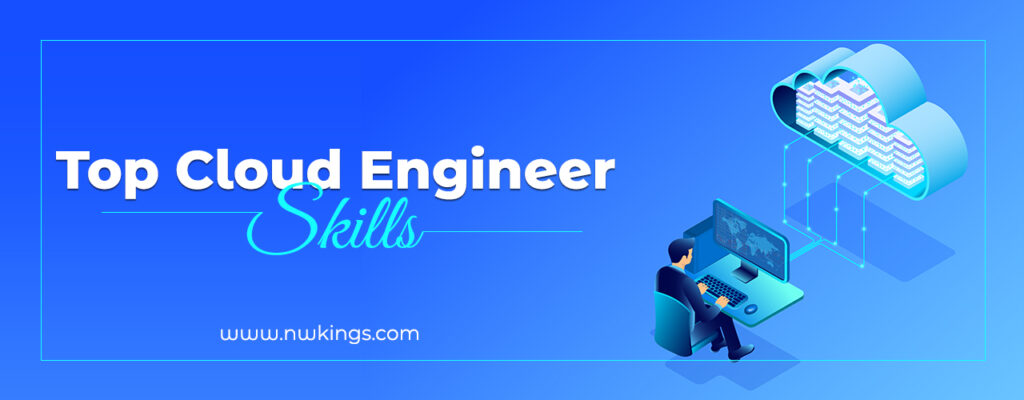
Cloud engineering is an upcoming and rapidly growing area in the IT world. It’s become a popular choice for those keen to make their mark on tech, with many successful folks choosing cloud engineering over more usual web development roles. So it’s important you know how to cultivate the soft abilities that will help you be an effective cloud engineer.
One of the vital skills any fruitful cloud engineer needs is collaboration. Working well as part of a team can boost your project success; but what does collaborating successfully look like?
Working with teams and stakeholders is key to ensuring that projects are delivered on time as well as having strategies in place for meeting deadlines. Cloud engineers, however, must also ensure they maintain strong relationships with their team members and other stakeholders so there is an understanding of how everyone works together which makes collaborating a lot easier.
Communication therefore becomes a major soft skill when it comes to getting ahead in the field of cloud engineering – discussing ideas clearly while taking into account different perspectives enables solutions tailored specifically for each unique situation. But what’s more important than technical know-how? It can be argued that combining both communication skills and teamwork could prove invaluable!
Being an effective communicator is a huge asset for anyone looking to pursue a career in cloud engineering, as it helps them be able to quickly identify potential problems and offer the best solutions that fit what their company or organisation requires. This would not only mean more efficient exchanges of ideas which can result in faster resolutions of difficult issues, but also ensure all individuals involved are aware and agree on one set timeline and objectives when taking on any project. Additionally, good time management skills are key too – being organised pays off!
Having the ability to organise workflows that cater for both short-term and long-term objectives makes cloud engineers more desirable when it comes to future projects. It’s also vitally important for people considering a career in this sector, as they’ll have multiple tasks on their plate each day – many of which will need completing within tight deadlines without compromising quality. By investing time into developing these basic skillsets, aspiring cloud engineers can give themselves an advantage over others who may not be aware of how beneficial such things are; setting them up nicely with everything they’ll require throughout their careers!
The prospects of Cloud Engineering in the technology industry

The tech industry is ever-changing, and cloud engineering has the limelight in this transformation. With demand for services linked to clouds on a steep rise, it’s clear that cloud engineering carries lots of potential when it comes to its prospects – networking, server management and app development are just some examples where engineers can make use of all that the technology offers. And with more businesses choosing away from traditional premises solutions these days too, having someone who knows about cloud engineering as part of your tech strategy simply makes sense!
Being a cloud engineer is no easy job. You’re responsible for designing, constructing and keeping up with distributed computing systems based on platforms like Amazon Web Services (AWS), Microsoft Azure and Google Cloud Platform (GCP). This entails having an in-depth understanding of these technologies to guarantee that all processes are running without any hiccups. As well as this, you need to be conversant with the most recent trends and advancements so that your skill set stays ahead of the curve. In other words, possessing advanced knowledge about current cloud technology is vital if you aim to succeed in this field!
The job market for cloud engineers is rocketing, all thanks to the massive requirement of their expertise. Companies are striving to get hold of seasoned pros who can manage complicated systems and guarantee that they work optimally while remaining protected. So if you’re considering turning into a cloud engineer, this couldn’t be a more perfect moment! You’ll need to dedicate some effort to understanding the details of this occupation before jumping right away, but when you do so long as it goes with success -you will find yourself perfectly situated to benefit from everything which this growing sector brings forth.
Ongoing Skills Development for maintaining a competitive edge as a Cloud Engineer
Being a cloud engineer requires having the proficiency to work with and incorporate different technologies. If you don’t grasp the pertinent technology stack, then creating dependable, safe and effective solutions on the cloud would be out of the question. This is why enhancing your skills continuously plays an essential role in remaining competitive as a professional cloud engineer. So what are those key areas that need attention when honing our engineering expertise?
To get the most out of modern IT infrastructure design it’s essential to grasp the core principles such as scalability, availability, security and performance. Plus you’ll need to understand what cloud services are available from providers like Amazon Web Services (AWS), Microsoft Azure or Google Cloud Platform (GCP). Lastly, a smart way forward is upskilling in specialised areas – think DevOps or software engineering. Get these skillsets under your belt and you can create complex systems that don’t sacrifice reliability or security yet remain cost-effective and scalable.
It’s essential to bear in mind that knowledge is constantly evolving, so it pays off to keep up with the latest tools and technologies from industry leaders as well as best practices for creating reliable applications within cloud setup. You can further widen your expertise by enrolling on online courses or attending exhibitions – this will help you stay ahead of new movements and inventions in what is a fast-changing area.
Ultimately, staying competitive takes commitment to learning; both formally through lessons but also informally keeping an eye on business news via blogs and podcasts. For those wanting a shift into Cloud Engineering or already working in the field who want to get ahead; there are lots of opportunities out there for honing their skills.
What courses can help me acquire the top cloud computing skills in IT?
The courses that can help me acquire the top cloud computing skills in IT are as follows-
AWS Solutions Architect
This course focuses on designing scalable and reliable solutions on Amazon Web Services (AWS), covering architectural best practices, service selection, and cost optimization for AWS cloud environments.
The exam details for the AWS Solutions Architect certification program are as follows-
Exam Name | AWS Certified Solutions Architect – Associate exam |
Exam Code | SAA-C02 |
Exam Level | Associate |
Exam Duration | 130 minutes |
Total Questions | 65 (MCQs and multiple response questions) |
Exam Cost | 150 USD |
Passing Score | 720 out of 1000 |
Exam Language | English, French, German, Italian, Japanese, Korean, Portuguese, Chinese and Spanish |
Testing Center | Pearson Vue |
AWS DevOps
AWS DevOps training teaches the principles of DevOps on AWS, emphasizing automation, continuous integration/continuous delivery (CI/CD), and infrastructure as code to streamline software development and deployment.
The exam details for the AWS DevOps certification program are as follows-
Exam Name | AWS Certified DevOps Engineer Professional exam |
Exam Code | DOP-C01 |
Exam Level | Professional |
Exam Cost | 300 USD |
Exam Format | MCQs or Multiple Response Questions |
Total Questions | 75 questions |
Passing Score | 750 out of 1000 |
Exam Duration | 180 minutes |
Languages | English, Simplified Chinese, Korean, and Japanese |
Testing Center | Pearson Vue testing center or online proctored exam |
Microsoft Azure
This course explores Microsoft’s cloud platform, Azure, covering various services for cloud computing, storage, networking, and application development within the Azure ecosystem.
The exam details for the Microsoft Azure certification program are as follows-
Exam Name | Microsoft Azure Administrator |
Exam Code | AZ-104 |
Exam Cost | USD 165 |
Exam Format | Multiple-choice questions |
Total Questions | 40-60 questions |
Passing Score | 700/1000 |
Exam Duration | 150 minutes |
Exam Language | English, Japanese, Chinese, Korean, Spanish, French, German, Italian, Indonesian |
Testing Center | Pearson VUE |
GCP Cloud
Google Cloud Platform (GCP) training provides insights into Google’s cloud services, including computing, data storage, machine learning, and cloud-native tools for application development.
The exam details for the GCP Cloud certification program are as follows-
Exam Code | GCP-ACE |
Exam Cost | USD 125 |
Number of Questions | 50 |
Test Format | Multiple Choice |
Duration | 120 Minutes |
Passing Score | 70% |
Docker
Docker training focuses on containerization technology, teaching how to create, deploy, and manage lightweight, portable containers for applications and microservices.
The exam details for the Docker certification program are as follows-
Exam Name | DCA (Docker Certified Associate) |
Exam Cost | 195 USD |
Exam Format | Multiple-choice questions |
Total Questions | 55 questions |
Passing Score | 65% or higher |
Exam Duration | 90 minutes |
Languages | English, Japanese |
Testing Center | Pearson VUE |
Certification validity | 2 years |
Kubernetes
Kubernetes training covers container orchestration, teaching how to manage and scale containerized applications efficiently using Kubernetes, an open-source container orchestration platform.
The exam details for the Kubernetes certification program are as follows-
Exam Name | Kubernetes Certified Administrator (CKA) |
Exam Cost | 300 USD |
Exam Format | Performance-based exam (live Kubernetes cluster) |
Total Questions | 15-20 tasks |
Passing Score | 74% or higher |
Exam Duration | 3 hours |
Languages | English, Japanese |
Testing Center | Pearson VUE |
Certification validity | 3 years |
Where should I enroll for these courses?
To enroll for the aforementioned cloud certification courses, one must choose a training platform with the best mentors providing quality education. And one such platform is Network Kings.
The pros of choosing Network Kings for the Cloud certification course training program are as follows-
- Learn directly from expert engineers
- 24*7 lab access
- Pre-recorded sessions
- Live doubt-clearance sessions
- Completion certificate
- Flexible learning hours
- And much more.
Wrapping Up!
In conclusion, cloud engineering is a booming area of technology with heaps of job prospects. To become a successful cloud engineer you need to have the necessary certifications and take courses that will teach you how to develop, deploy and manage various kinds of cloud systems. Having an abundance of different certification options within multiple cloud platforms as well as hands-on experience gives aspiring engineers all they need for success in this field. So why not give it a go? Who knows – maybe one day we’ll be looking up your name on the list!
Welcome to our Cloud Architect Master Program! Our comprehensive programme will give you the essential skills and expert knowledge you need to become a successful cloud architect. Our instructors are top-notch industry experts, making this course perfect for any IT professional who’s looking to take their career up a notch.
In this groundbreaking program, we’ll teach you all about cutting-edge cloud computing technology and architecture as well as guide your hands-on experience designing and deploying real-world projects from scratch. Whether just starting or an experienced pro in the field of IT – our curriculum is equipped with everything that can help get certified in cloud architecture.
So don’t miss out on such a chance! Sign up today at our Cloud Architect Master Program and open your doors to possibilities waiting ahead! With carefully crafted courses backed by extraordinary teaching staff – realise how far your talent can carry you as one of the leading tech architects around town now.
Happy Learning!

